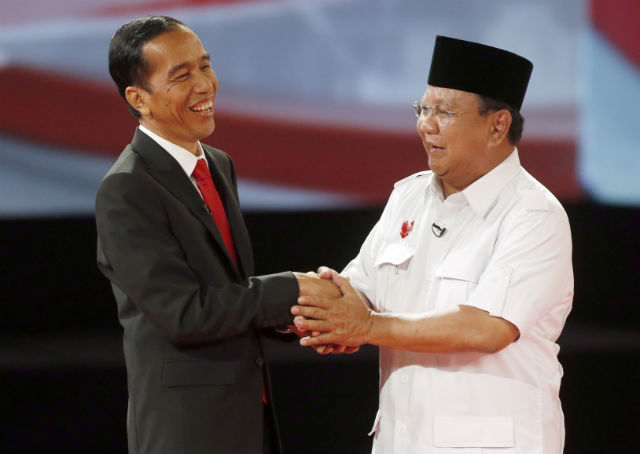SUMMARY
This is AI generated summarization, which may have errors. For context, always refer to the full article.

JAKARTA, Indonesia – The leading candidate in Indonesia’s two-way presidential race said on Sunday night, June 15, he would put barriers in place to protect domestic businesses from foreign competition ahead of the ASEAN Economic Community in 2015, but maintained Indonesia would be open to investors.
Answering a question posed by rival Prabowo Subianto during the second presidential debate, Jakarta governor Joko “Jokowi” Widodo said he believed Indonesians are competitive abroad and should be supported. “The government has to give support [to Indonesian businesses] so we should always be on the offense. We have to strike first; we have to explore foreign markets.”
But Jokowi, a former furniture businessman with a strong export focus, quickly added that barriers could be put in place to favor Indonesian businesses in their home turf – a lucrative market of 250 million people, with a middle class that is growing by 8-9 million people a year.
For instance, when it comes to issues such as licenses, Jokowi said: “I think we can expedite the process for local or domestic investors, but for foreign investors perhaps we can make it a bit difficult for them. That’s fine. All countries are doing this; there are always barriers. There are invisible barriers in place.”
There are worries throughout the region over what AEC 2015 will bring once it begins. While it offers a larger playground for businesses, it also poses the threat of greater competition.
Indonesia, the destination of US$23 billion in foreign direct investment in 2013, has increasingly adopted protectionist policies under outgoing President Susilo Bambang Yudhoyono, much to the chagrin of foreign investors. This is unlikely to change in the next presidency as both candidates to replace him have nationalistic stances as well. Other analysts have argued, however, that Indonesia is just correcting policies that have left it too open to foreigners, and that it in fact remains to be a liberal market.
“As a government, we have to formulate regulations that impose barriers so it will not be as easy to enter our markets,” Jokowi added during the debate. “We are open, but what is paramount is to protect our national economy.”
He added that Indonesian businesses would similarly find barriers when they try to enter foreign markets, such as in the case of the banking sector. “If we want to invest abroad, there will be barriers whether through business regulations, government policies, etc.”
The protectionist statements issued by Jokowi, who is favored by foreign investors over Prabowo, plays to the general electorate’s sentiments but raised some worries.
Yohanes Sulaiman, an analyst and lecturer at the Indonesian National Defense University, tweeted that Jokowi’s statements would spook investors, but that it was good the ASEAN Economic Community was being discussed.
What worries me the most is all these talks about economic nationalism. This will spook investors — even though I doubt if any of them win
— Yohanes Sulaiman (@YohanesSulaiman) June 15, 2014
Aulia Masna, the chief editor for tech website DailySocial, tweeted that the statements could affect Jokowi’s foreign relations.
Joko is torpedoing his foreign relations and investment chances by talking about barriers ahead of AFTA 2015 #debatcapres
— Aulia Masna (@amasna) June 15, 2014
On the other hand, Aldian Taloputra, an economist at Mandiri Sekuritas, qualified Jokowi’s response for Jakarta Globe. “I think, maybe what Jokowi was trying to say was that the country should become more prudent in welcoming foreigners into the country.” – Rappler.com
Add a comment
How does this make you feel?
There are no comments yet. Add your comment to start the conversation.